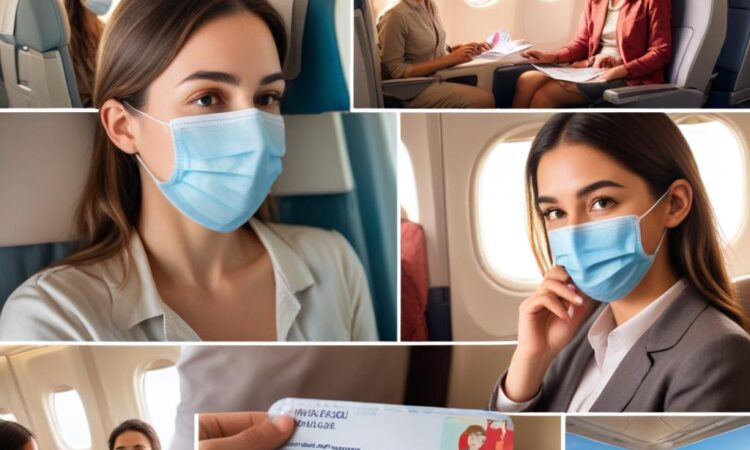Post-Pandemic Travel Rebound & Safety Measures
The world is reopening, and with it, a surge in travel. After the unprecedented disruption caused by the pandemic, people are eager to explore again, to reconnect with loved ones, and to experience the wonders of different cultures and landscapes. However, the lingering effects of the pandemic mean that travel in the post-pandemic world necessitates a careful and informed approach. This article delves into the realities of navigating this new travel landscape, focusing on health and safety protocols, the crucial role of travel insurance, and adapting to the evolving norms that are shaping the travel experience.
Health and Safety Protocols: A New Standard
The pandemic has irrevocably changed the way we travel. What were once considered standard practices have been replaced by new safety measures designed to minimize the risk of infection. Airlines, hotels, and tourist attractions have implemented various protocols, and understanding these is critical for a safe and stress-free trip.
Air Travel: Airlines have introduced enhanced cleaning procedures, often involving the use of electrostatic sprayers to disinfect surfaces. Many airlines also require or strongly recommend the wearing of face masks throughout the flight. Check-in procedures have often been digitized to minimize contact, and social distancing measures may still be in place in boarding areas and on the plane itself. Be prepared for temperature checks at airports, and familiarize yourself with the airline’s specific COVID-19 related policies before your departure.
Accommodation: Hotels and other accommodations have implemented rigorous cleaning protocols, including the use of hospital-grade disinfectants and enhanced ventilation systems. Many hotels are also offering contactless check-in and check-out options, and some may still have restrictions on occupancy in shared spaces such as pools or gyms. Check the hotel’s website for their specific safety measures before booking.
Tourist Attractions: Tourist attractions such as museums, theme parks, and national parks have adapted their operations to ensure visitor safety. This may involve timed entry systems to manage crowds, enhanced cleaning schedules, and the use of hand sanitizer stations throughout the site. Check the attraction’s website for specific guidelines and any capacity restrictions before your visit.
Personal Responsibility: Beyond the measures implemented by travel providers, personal responsibility remains paramount. Staying up-to-date on local health guidelines, practicing good hygiene (frequent handwashing, mask-wearing where appropriate), and maintaining social distancing where possible are crucial steps in minimizing risk.
The Importance of Travel Insurance
In the post-pandemic world, travel insurance is no longer a luxury; it’s a necessity. Traditional travel insurance policies may not adequately cover all pandemic-related disruptions, so it’s vital to carefully review the policy details before purchasing. Look for policies that offer comprehensive coverage for trip cancellations, medical emergencies (including COVID-19 related illnesses), and potential quarantine costs.
Coverage Considerations: Consider the following aspects when choosing travel insurance:
- Trip cancellation coverage: This covers the costs associated with canceling your trip due to unforeseen circumstances, including illness (including COVID-19), unexpected travel restrictions, or natural disasters.
- Medical expenses coverage: This covers the costs of medical treatment abroad, including hospitalization and emergency medical evacuation. Ensure the policy covers COVID-19 related illnesses.
- Quarantine coverage: Many policies now offer coverage for unexpected quarantine costs, both in terms of accommodation and lost trip expenses.
- Baggage loss or delay coverage: This covers the costs associated with lost or delayed luggage.
- Emergency assistance services: This provides 24/7 access to emergency assistance services, including medical referrals and support in case of emergencies.
Reading the Fine Print: Carefully read the policy documents and understand the terms and conditions before purchasing. Pay close attention to exclusions and limitations, and don’t hesitate to contact the insurance provider if you have any questions.
Adapting to New Norms
Travel in the post-pandemic era requires a certain degree of adaptability. Be prepared for changes to travel procedures, potential delays, and the need to be more flexible with your plans.
Flexibility is Key: Be prepared to adjust your itinerary if necessary. Unforeseen circumstances, such as flight cancellations or changes in local regulations, may require you to be flexible and adapt your plans accordingly.
Digitalization of Travel: The travel industry has embraced digitalization to minimize physical contact. Be prepared to use mobile check-in for flights and hotels, and utilize digital versions of travel documents and tickets.
Enhanced Hygiene Practices: Prioritize good hygiene throughout your trip. Carry hand sanitizer, wear a mask where required or recommended, and practice social distancing whenever possible. Be mindful of local regulations and guidelines.
Communication is Crucial: Stay informed about the latest travel advisories and regulations. Keep in regular contact with your travel providers and be aware of any potential changes to your itinerary.
Respect Local Customs: Respect local customs and regulations regarding health and safety. This will not only contribute to a safer travel experience but will also demonstrate respect for the local culture.
Conclusion
Traveling in the post-pandemic world presents unique challenges, but it also offers incredible opportunities. By understanding and adhering to the new safety protocols, securing appropriate travel insurance, and adapting to the evolving norms, you can significantly reduce your risk and enjoy a safe and memorable travel experience. Remember that responsible and informed travel is key to ensuring a positive experience for yourself and for the communities you visit.
The post-pandemic travel rebound is underway, and with careful planning and a responsible approach, the world is once again open for exploration.

